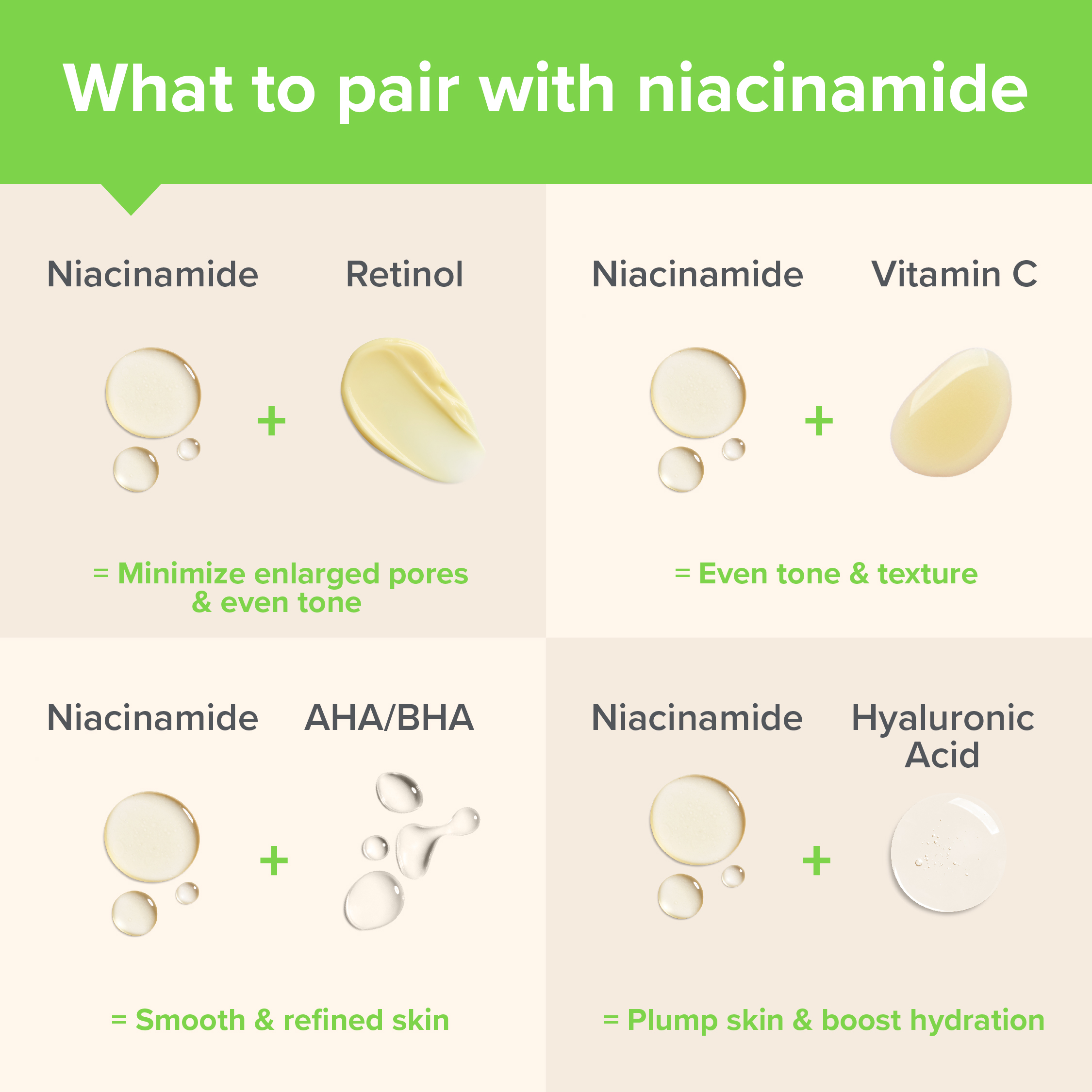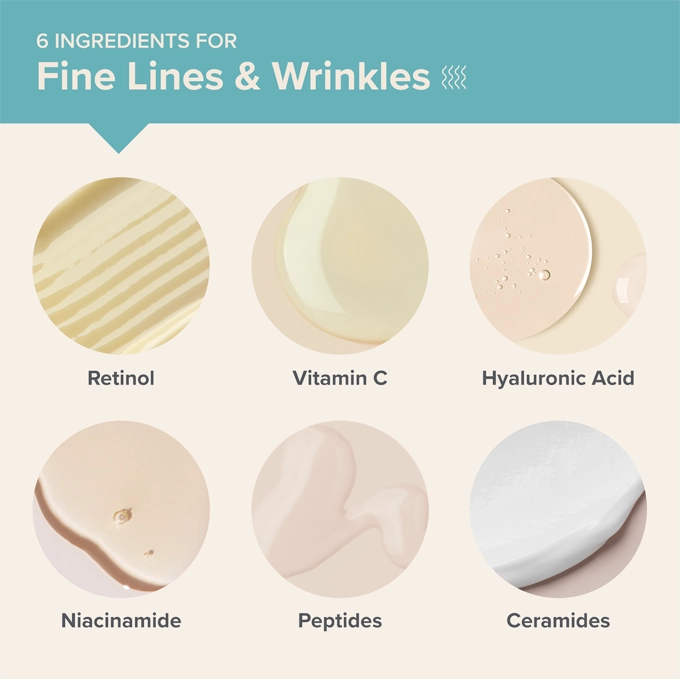This post contains affiliate links.
Updated on September 12, 2024
Yes, niacinamide is good for dry skin. It helps improve skin hydration and strengthens the skin barrier.
Niacinamide, also known as Vitamin B3, is a powerhouse ingredient in skincare. It offers numerous benefits for dry skin, making it an essential addition to your skincare routine. This versatile ingredient enhances the skin’s moisture retention, which is crucial for combating dryness.
It also strengthens the skin barrier, reducing water loss and protecting against environmental damage. Dermatologists recommend niacinamide for its ability to soothe and hydrate the skin without irritating it. Suitable for all skin types, niacinamide can be easily incorporated into your daily regimen. For optimal results, look for products with at least 5% concentration and pair them with other hydrating ingredients.

Contents
Benefits Of Niacinamide
Niacinamide, also known as Vitamin B3, offers many benefits for dry skin. This powerful ingredient hydrates and strengthens the skin barrier. It is loved by skincare experts and users alike.
Hydration Boost
Niacinamide helps the skin retain moisture. This is essential for dry skin. It improves the skin’s ability to hold water, keeping it plump and hydrated. Dry skin often lacks moisture, leading to flakiness and irritation. Niacinamide addresses this by boosting hydration levels.
Barrier Strengthening
Niacinamide enhances the skin’s natural barrier. A strong barrier protects against environmental stressors. Dry skin can be more prone to damage and sensitivity. Strengthening the barrier with niacinamide helps prevent these issues. It keeps the skin healthy and resilient.
| Benefits | Details |
|---|---|
| Hydration | Helps the skin retain moisture |
| Barrier Strength | Enhances the skin’s natural defense |
- Hydration Boost: Keeps skin plump and moist.
- Barrier Strengthening: Protects against damage and sensitivity.
Niacinamide is a must-have for those with dry skin. It offers hydration and barrier support. This makes it a powerful ingredient in skincare routines.
Read More – Is Hyaluronic Acid Good for Dry Skin? Discover Its Hydrating Benefits
How Niacinamide Works
Niacinamide, also known as Vitamin B3, is a powerful ingredient. It is famous for its ability to improve skin health. But how does it work, especially for dry skin? Let’s explore its mechanisms.
Cellular Function
Niacinamide enhances cellular function by boosting the production of ceramides. Ceramides are lipids that help maintain the skin’s barrier. A stronger barrier means less moisture loss. This is crucial for dry skin.
It also aids in the synthesis of proteins like keratin. These proteins are essential for healthy skin structure. They help the skin stay firm and hydrated.
Anti-inflammatory Properties
Another benefit of niacinamide is its anti-inflammatory properties. It reduces skin redness and irritation. This is especially helpful for people with dry, sensitive skin.
Niacinamide can also soothe conditions like eczema. It calms the skin and reduces flare-ups. This makes it a versatile ingredient for dry skin issues.
Read More – Can Old Spice Lotion Help Dry Skin? Expert Insights And Tips for Hydration
Niacinamide In Skincare Products
Niacinamide, also known as vitamin B3, is a powerful skincare ingredient. It offers numerous benefits for dry skin. You’ll find niacinamide in various skincare products. These products help to hydrate and protect the skin.
Serums
Niacinamide serums are highly concentrated. They deliver potent benefits directly to the skin. Serums with niacinamide can reduce redness and irritation. They also improve the skin’s barrier function. This keeps moisture in and harmful elements out.
- Hydrating: Serums with niacinamide provide intense hydration.
- Anti-Inflammatory: They reduce redness and soothe the skin.
- Protective: Improves the skin’s natural barrier.
Apply niacinamide serums after cleansing. Follow up with a good moisturizer.
Moisturizers
Niacinamide moisturizers are essential for dry skin. They lock in moisture and improve skin texture. These moisturizers can also reduce fine lines and wrinkles. They offer long-lasting hydration throughout the day.
| Benefit | Description |
|---|---|
| Hydration | Locks in moisture for soft, supple skin. |
| Anti-Aging | Reduces fine lines and wrinkles. |
| Even Skin Tone | Improves overall skin tone and texture. |
Use niacinamide moisturizers twice daily for best results. Apply to clean, dry skin in the morning and evening.
Read More – Is Aloe Vera Gel Good for Dry Skin? Exploring Its Benefits And Uses
Expert Tips For Dry Skin
Dealing with dry skin can be challenging. Niacinamide offers relief and nourishment. Follow these expert tips for optimal results.
Application Techniques
Proper application is key to reaping the benefits of niacinamide.
- Cleanse your face with a gentle cleanser.
- Pat skin dry with a soft towel.
- Apply niacinamide serum evenly across your face.
- Follow with a moisturizer to lock in hydration.
Complementary Ingredients
Combining niacinamide with other ingredients can enhance its effectiveness.
| Ingredient | Benefit |
|---|---|
| Hyaluronic Acid | Boosts hydration and plumps skin. |
| Ceramides | Strengthens skin barrier and retains moisture. |
| Glycerin | Draws moisture into the skin. |
Use these ingredients in conjunction with niacinamide for best results.
Potential Side Effects
Niacinamide, also known as Vitamin B3, is popular for its skincare benefits. But, like all skincare ingredients, it has potential side effects. Here, we discuss common side effects of niacinamide, especially for dry skin.
Allergic Reactions
Allergic reactions to niacinamide are rare but can happen. Symptoms include redness, itching, and swelling. If you notice these, stop using the product. Consult a dermatologist for advice. Allergic reactions may need medical treatment.
Irritation
Some users experience irritation from niacinamide. This can manifest as mild burning or stinging. Irritation often occurs with overuse or high concentrations. Start with a lower concentration to avoid this.
For sensitive skin, do a patch test first. Apply a small amount on your inner arm. Wait 24 hours to see if any irritation occurs. If no reaction, you can use it on your face.
| Concentration | Suitable For | Risk Level |
|---|---|---|
| 2%-5% | Beginner | Low |
| 5%-10% | Experienced | Moderate |
| Above 10% | Advanced | High |
Using a moisturizer after niacinamide can reduce irritation. Look for products with soothing ingredients. Examples include aloe vera or hyaluronic acid. These help maintain skin moisture and calm irritation.


Frequently Asked Questions
What Is Niacinamide?
Niacinamide, also known as vitamin B3, is a water-soluble vitamin that supports skin health.
Is Niacinamide Good For Dry Skin?
Yes, niacinamide improves the skin barrier, retains moisture, and reduces dryness.
How Does Niacinamide Benefit Dry Skin?
Niacinamide boosts ceramide production, which enhances the skin’s natural moisture barrier.
Can Niacinamide Cause Skin Irritation?
Niacinamide is generally well-tolerated and unlikely to irritate, even for sensitive skin types.
How Often Should I Use Niacinamide?
Use niacinamide daily, either in the morning or evening, for best results.
What Products Contain Niacinamide?
Niacinamide is found in serums, moisturizers, and toners designed for skin care.
Conclusion
Niacinamide can be a great addition to your skincare routine for dry skin. It helps retain moisture and soothes irritation. Incorporate it gradually and observe your skin’s response. Always consult a dermatologist for personalized advice. Invest in quality products for the best results.
Recommended:
- The 10 Best Korean Moisturizers For Dry Skin
- The 10 Best Body Washes For Dry Skin
- Our 10 Best Powder Foundations For Dry Skin To Buy




